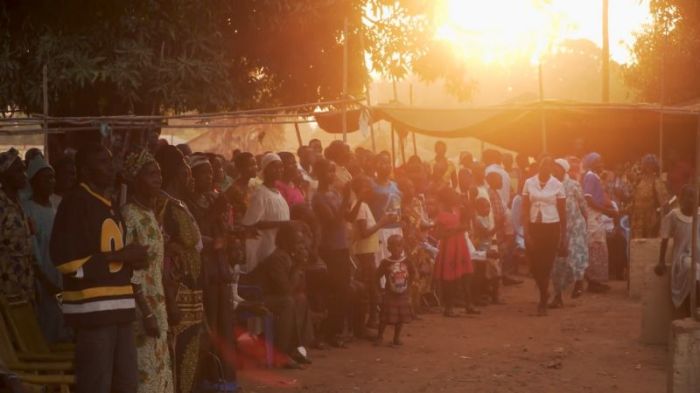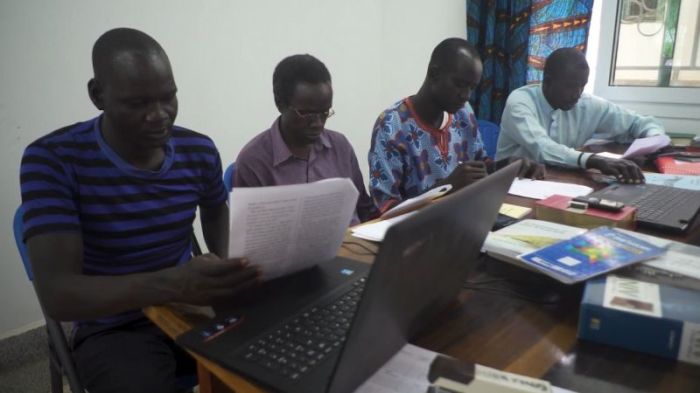Wycliffe Bible Translators Completes 1,000th Translation; Christians With Nothing Give Themselves to God

Hundreds of Christians, with nothing to give, gave themselves to God as Wycliffe Bible Translators completed its 1,000th full translation of the New Testament in South Sudan.
The major milestone was achieved in August, though accounts for only 10 percent of the world's languages. Some of the remaining 90 percent have incomplete translated Bibles at various stages, but an ambitious project is looking to have Bible translation efforts on the way in every last language of the world by 2025.
Wycliffe USA Chief Operations Officer Russ Hersman described to The Christian Post in a Wednesday email the scenes at the dedication of the Keliko Bible in South Sudan last month:
"The day after the dedication of the Keliko New Testament, there was a church service in the Bidi Bidi Refugee Camp, the second largest refugee settlement in the world with more than one-quarter million refugees. The church service was almost a second mini-dedication. During the service, the pastor called for an offering to be taken. Hundreds of people streamed forward."
Hersman added: "Where refugees got bills and coins to put in an offering is a mystery, however there were many who had nothing to give ... but they still came forward and put their hand into the offering basket. It was as if they were saying, 'I give myself to the Lord.' These are the people for whom the Keliko translation was done."
With the Keliko Bible, now roughly 10 percent of all the world's languages have a completed Bible. Close to 2,500 other languages have translations underway, but as many as 1,600 languages, or 22 percent, have no translated Scripture at all, the organization says.
Wycliffe's "Vision 2025" goal of having all 7,000 of the world's languages see a Bible translation project underway by the year 2025 faces notable challenges, however, with close to 45 percent of the world's languages set to go extinct by the end of the century because they lack a written form.
Still, technology has made the translation process faster and more efficient. As Hersman told CP, it took the organization 50 years to reach the 500 translation milestone in 2001, but only 17 years to complete the next 500.
"This acceleration – cutting decades-long translation projects down to a matter of years – is largely the result of a combination of the growth of the Church in the South and the East coupled with technological advancements that have made the process of translation, as well as broader communication and travel, much faster," he said.
"The unprecedented growth of local leadership and national translators involved and spearheading projects, working collaboratively with neighboring communities and similar language groups, accelerates the translation work."
Hersman revealed that the largest cluster of languages that do not have any Scripture at all are in the South Pacific islands, where close to 1,300 different languages in total are spoken. Papua New Guinea, for instance, has more than 800 languages alone.
"The biggest challenge is sheer volume, but geographic accessibility and — in some cases — lack of a written alphabet are significant obstacles as well. That's part of what the community-based approach is meant to address," he explained.
"By bringing together groups of people who speak different but similar languages, they can collaborate on translation projects, learning from each other and building community while speeding up the process."
Wycliffe Bible Translators has faced different challenges in its Vision 2025 goal, including dealing with unfriendly governments and other world religions that oppose Bible translation projects.

"Sometimes the difficulties are in places that are thought to be open to Bible translation, but due to civil unrest in the country, it becomes a dangerous environment for anyone caught between the warring parties," Hersman noted.
"We desire that all people have access to God's Word, and we trust in God and his sovereignty over all creation, even in the face of persecution, instability and danger."
The war-torn South Sudan, the location of the 1,000th completed Bible project, is one such example.
"The Keliko people of South Sudan have endured significant hardship as a result of the unrest in their region. In the 1980s and 1990s the civil war in south Sudan made it impossible for the community to stay in place. Many Keliko sought refuge in Uganda and the Democratic Republic of Congo," Wycliffe USA's COO explained.
"After the peace was signed with the government of Sudan, people started returning to their homeland. However, in 2013 ethnic fighting broke out in the world's newest nation, South Sudan. Even though the Keliko were not involved in that ethnic fighting, the fighting still spread and effected the Keliko homeland. A majority of the Keliko again fled as refugees in Uganda and DRC," he added.
The translation efforts and hearing Jesus' words in their own language have transformed communities, as Wycliffe's President Bob Creson told CP in a previous interview in 2017. In one instance in Bambalang, Cameroon, the locals suffered greatly as close to 300 of their homes were burned down by a neighboring village.
"In the midst of the devastation, many were angry and wanted to seek revenge. But the words of Jesus in the Chrambo language about loving enemies has brought comfort, healing and forgiveness to the people of Bambalang," Creson shared at the time.
Hersman pointed out that when it comes to reaching many of the other language groups in difficult-to-access regions of the world, far more than just linguistic efforts are required to accomplish the goal.
"Our work includes administrative tasks, logistics, teaching, information technology, community partnering, data gathering, coaching, etc. The organizational complexity adds to the overall challenge of Vision 2025, but we are blessed to have extremely talented people in each of these disciplines," he said.
"And while technology has exponentially accelerated the actual translation process, identifying unreached languages and working with the communities to understand how to accurately translate the Bible — all before the actual translation process begins — takes time."




























